Arthur J Pais in New York
After waiting for Rohan Sippy for over 15 minutes beyond schedule outside Saravana Bhavan in New York, I call his handler. He can't locate Sippy; the cell phone is switched off. I gave myself 10 more minutes, and then five. Sippy then appears, with a boyish grin and a bag full of books. He says he lost count of time in the book shop.
Now, how can one remain upset with someone who is so absorbed by books?
Like actor Rahul Bose and fellow director Anurag Kashyap, Stanford University-educated Sippy just can't resist spending hours at a book shop. So, it is natural that our chat before the release of Dum Maaro Dum, his third directorial venture in a decade-long career, gravitates to books.
"In Hollywood, filmmakers are known for making films out of books," Sippy says. "In India, I believe in the regional cinema, producers and directors go for published books. It is not that we haven't made films out of books in Hindi cinema, but we ought to pay more attention. One reason why in a week there could be two hit films in Hollywood is because of the variety. Hollywood also knows how to make good films from a Broadway play or a musical. This could be the next step for us, to look at our own literature and books."
His Dum Maaro Dumo, a musical thriller set in Goa, is written by Shridhar Raghavan.
"I fell in love with the script even before I read 50 pages," Sippy says. "Shridhar is very good at playing with twists in the tale. I really enjoyed the rollercoaster ride of his script. Bluffmaster [also scripted by Shridhar] was a dark-hearted con comedy. This film [DMD] is very different. It is gritty and tough, set against wonderful locations, but it also has an emotional center. My first two films [the unsuccessful Kuch Naa Kaho and the multiplex hit Bluffmaster] have had very different stories. Each experimentation challenges me a little more, and I hope makes me a better storyteller."
'A good script holds the key to the success of a film'
Image: A scene from Dum Maaro DumThe two discussed the script over Old Monk, he says. "And we knew we had to make this film together. It also has far less English dialogues than Bluffmaster and that could broaden its appeal."
Sippy, who has also produced the big-budget turnip Chandi Chowk To China, the quirky The President Is Coming, and the multiplex hit Taxi No 9211, is one of those filmmakers who refuse to blame the audience for a film's failure.
"If we make good films, there is no way they (audiences) won't come, even if they are released in the same week," he says, illustrating his point with the example of Lagaan and Gadar, which were released together, yet went on to become mega hits.
"A good script holds the key to the success of a film," Sippy says, adding that the best lesson he has learned from his father Ramesh Sippy (Sholay) was assembling a superb team of writers and artists.
The new film, which brings him together with his school friend Abhishek Bachchan for the third time, tells the story of a tough cop, Kamath (Bachchan); Lorry (Prateik), who is paying a heavy price for taking short cuts; DJ Joki (Rana Daggubati), a musician who has realised remaining silent can cause lasting damage; and Zoe (Bipasha Basu), who is also paying a price for taking a wrong turn in the ambition alley. The film, being released by Fox Star Studio, has cameos by Deepika Padukone and Vidya Balan.
'Prateik is chronically, painfully shy'
Image: A scene from Dum Maaro DumThere was a lot of nostalgia while making this film," Sippy, who produced it with his father says. Abhishek's father Amitabh and Prateik's mother Smita Patil had starred in Shakti directed by the elder Sippy.
"Prateik is chronically, painfully shy," Sippy says. "Yet, he lights up the screen. His was perhaps one of the hardest roles to play in the film -- a 17-year-old typical middle class kid fighting failure, jealousy, loss, lust, temptation, hormones, sheer abject terror had a formidable challenge to balance all these elements. He has pulled it off outstandingly. His story is the heart, the driver of the film, the trigger that sets Kamath and Joki in motion."
Abhishek is not cast because of friendship, Sippy says. He wanted Abhishek for Joki's role, but the star felt an instant connection to Kamath.
"There is something so empathetic about ACP Kamath, that you just want to be on his side," the filmmaker says, adding. "Abhishek can pass off for a police officer because he has the right physique. Some of the younger actors these days seem a bit too Westernized."
'Bipasha had to look attractive and vulnerable'
Image: A scene from Dum Maaro DumThe two would discuss the film at length, right up to the shoot. "But on the set, he is the director and I am the actor," Abhishek says. "If he says cut, I know he is really satisfied. If he says, one more time, I know the reason. Rohan is very focused and he knows what is good for the film."
The movie is also enhanced by older artists like Aditya Pancholi, who plays a businessman confronting Kamath, and Govind Namdev, the cop who is a guide and cynical mentor to Kamath, Sippy says. But one of the performances that impressed him the most was Bipasha's.
"Her character graph undergoes a complete transition," he says. "She had to look attractive and vulnerable. She has delivered one of the finest, most poignant, performances in the film. She brought a grace to Zoe's character that no one could envision."
Raghavan has said each of the characters is so central to the plot, that it would have been difficult to move the plot forward without intertwining their lives.
'One of the best sequences in the film was a candid shoot at the Night Market'
Image: A scene from Dum Maaro DumWe make space to narrate each of the key stories and then make sure they all converge," Sippy says.
And the backdrop, Goa, just sets it off perfectly. Sippy and Raghavan agree that though the state is not the story, it offers a superb setting.
'One of the best sequences in the film was a candid shoot at the Night Market,' Sippy says in the production notes. 'There were huge crowds and we were short of manpower, we needed Abhishek to move through the Night Market without people realising that a Hindi film star was in their midst and looking into the camera. This is the beauty of Goa. People will leave you alone and let you do your work. I must say when it comes to crowd management Goa is simply unparalleled, probably one of the best places in India to shoot.'
Sippy hopes to return to Goa for another project.

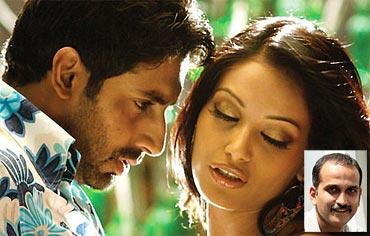
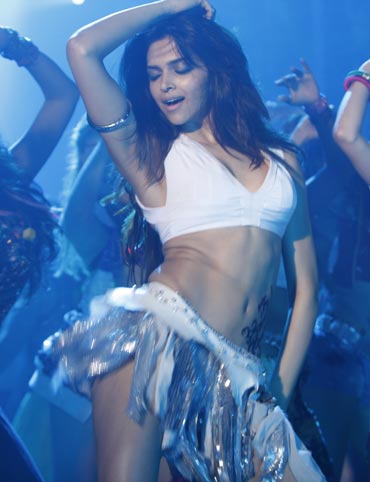
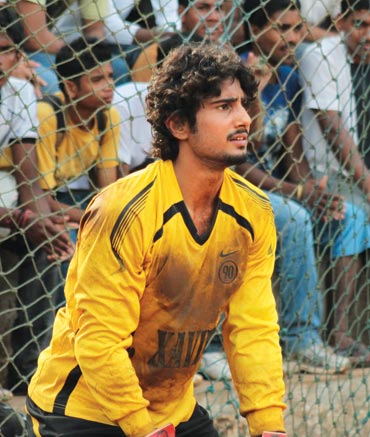
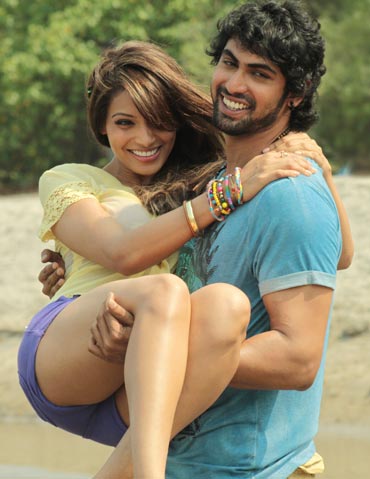
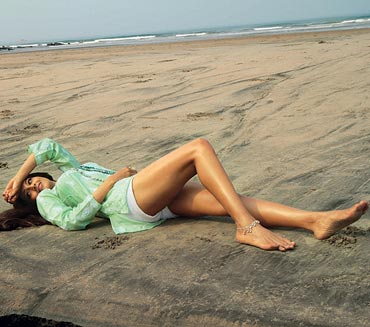
Comment
article